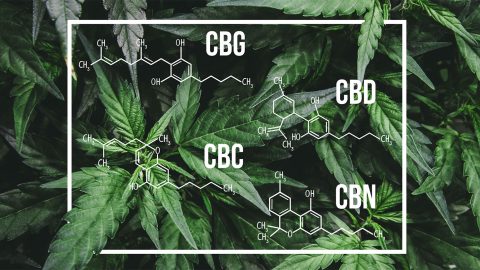What is Cannabidiolic Acid?
Cannabidiolic acid (CBDA) is one of more than 100 known cannabinoids in the cannabis plant and is produced from cannabigerolic acid (CBGA). CBDA exists primarily in raw hemp because once it is decarboxylated by exposure to sufficient heat or light, it chemically converts into cannabidiol (CBD). And like CBD, CBDA is not intoxicating.
Research to date indicates CBDA may not interact with the body’s endocannabinoid system in the same manner CBD does. It appears CBDA impacts the cyclooxygenase-2 (COX-2) enzyme to reduce inflammation similar to some non-steroidal anti-inflammatory drugs.
Some preclinical studies appear to support CBD as an effective treatment for anxiety. Likewise, additional animal studies indicate CBDA may also be helpful for anxiety symptoms.
In a 2017 study of anxiety responses in rats, researchers examined the effects of CBDA, CBD, and tetrahydrocannabinol (THC). The rats were placed in a box with a dark compartment and a door to an illuminated compartment. Rats prefer a dark environment, however when in a new setting, they have a desire to explore.
The effects of THC and CBDA on the rats before and after the introduction of a foot shock stressor was examined. Before the foot shock stressor was introduced, THC produced anxiety-like responses in the rats, while CBDA appeared to have no effect.
After researchers applied the foot shock stressor, those treated with THC had an increased anxiety response. Conversely, administration with either CBDA or CBD prevented an anxious response in the rats. The researchers concluded that when confronted with a stressful event, CBDA and/or CBD may be beneficial in controlling anxiety symptoms.
In another rodent study in 2013, investigators found that compared to CBD, CBDA “displays significantly greater potency” at inhibiting nausea and vomiting in rodents. CBDA also enhanced activation of the 5-HT1A (serotonin 1A) receptor. Activation of this receptor has been involved with anti-anxiety and anti-depressant medications.
Without debate, additional research is needed to examine the initial experimental findings and to further test the conclusions of these studies. However, encouraging results from studies such as these appear to offer hope that humans may achieve similar benefits from cannabinoids such as CBDA.
References:
Takeda S et al; Cannabidiolic acid as a selective cyclooxygenase-2 inhibitory component in cannabis; Drug Metabolism and Disposition; 2008 Sep; 36(9): 1917 – 1921.
Rock E et al; Effect of prior foot shock stress and Δ9-tetrahydrocannabinol, cannabidiolic acid, and cannabidiol on anxiety-like responding in the light-dark emergence test in rats; Psychopharmacology; 2017 Jul; 234(14): 2207 – 2217.
Bolognini G et al; Cannabidiolic acid prevents vomiting in Suncus murinus and nausea-induced behaviour in rats by enhancing 5-HT1A receptor activation; British Journal of Pharmacology; 2013 Mar; 168(6): 1456 – 1470.
Author Bio:
Dr. Wright Penniman M.D. is a board certified family physician with 15 years of clinical experience and 4 years of experience as a medical director with a major health insurance company.
